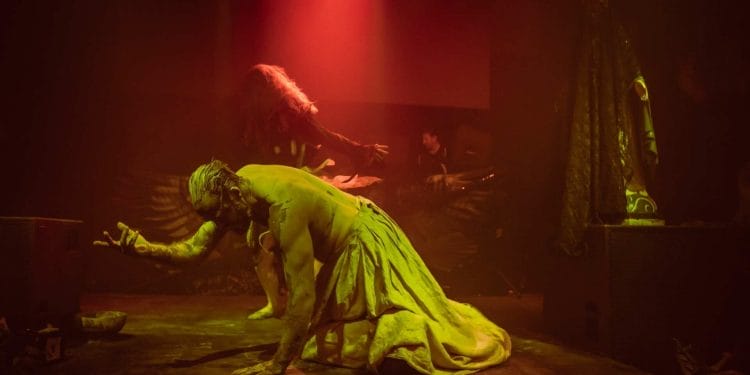 The Tragedy of Macbeth is showing at the Assembly Roxy and is, as the name suggests, a re-telling of William Shakespeare’s Macbeth by Flabbergast Theatre. Macbeth and Banquo find three witches who tell them both that Macbeth will become King of Scotland and Banquo will sire a line of kings. Tragedy ensues for Macbeth and those around him.
The Tragedy of Macbeth is showing at the Assembly Roxy and is, as the name suggests, a re-telling of William Shakespeare’s Macbeth by Flabbergast Theatre. Macbeth and Banquo find three witches who tell them both that Macbeth will become King of Scotland and Banquo will sire a line of kings. Tragedy ensues for Macbeth and those around him.
First point I would advise is if you are looking to see The Tragedy of Macbeth and have sensory issues, then sitting at the back of the audience would be best as the clay, paint and wine that they use during the course of the production can become quite strong smelling, and the projection of the cast is very good so sitting at the back might be better for those with delicate hearing.
As for the performances, the cast did a good job in creating an animalistic outpouring of both agony and ecstasy, manipulating our interpretation of the text through their emotions. In particular, the emotional range exhibited during the show by Duncan/Macduff was exceptional with multiple levels. At times, the other performances felt a little one note. There was a strong focus on physicality and movement which is what Flabbergast are best at doing, but the text felt as though it were a secondary consideration at times.
In between the two acts, The Tragedy of Macbeth employed the use of physical comedy by one of the performers who was irreverent and amusing during his interactions with the audience. However, this section went on a little too long and it began to become laboured.
There are two sections of performance that are worthy of note and those are the relationship between Macbeth and Lady Macbeth and Macbeth and Banquo’s ghost. The relationship expressed on stage was very physical, sensual with symmetry of movement and later, almost violent, displaying the destructive nature of their marriage. In terms of Macbeth and the haunting of Banquo’s ghost, it is one of the cleverer interpretations I have seen of this on stage. Banquo’s ghost pouring wine into Macbeth’s glass when he is not looking was particularly interesting.
In summary, it is clear that Flabbergast paid particular attention to create a highly physical theatrical production, but as an interpretation of the text, this focus on physicality and movement was not always in the favour of The Tragedy of Macbeth.

















